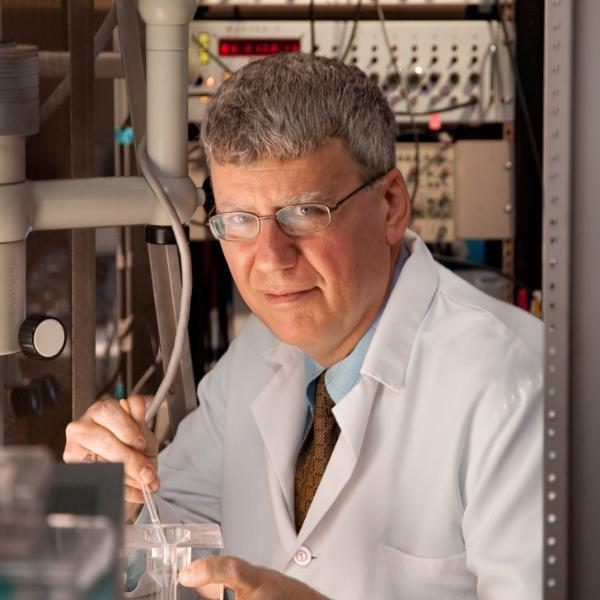Education
- Ph.D., Pharmacology, Uniformed Services University of the Health Sciences
- B.S., Natural Sciences, Johns Hopkins University
- Post-Graduate Studies, Neurophysiology, Max Planck Institute for Psychiatry
- Post-Graduate Studies, Biophysics, The Johns Hopkins University
Areas of Expertise
- Traumatic Brain Injury
- Seizure Research
Honors and Awards
- Alexander von Humboldt Foundation Fellow
- Klingenstein Fellow in the Neurosciences
- Office of Naval Research Young Investigator Award
- American Physiological Society Frontiers in Physiology Investigator
Research
Dr. Stanton's lab is investigating the cellular mechanisms underlying neuronal plasticity, including: 1) properties of long-term activity-dependent potentiation (LTP) and depression (LTD) of synaptic strength; 2) links between biochemical signaling cascades underlying LTD and LTP; 3) changes in synaptic function and structure associated with Alzheimer’s disease, traumatic brain injury, depression, stroke, migraine headache, perinatal lead exposure, and the development of epileptic seizures; and 4) cellular mechanisms that both trigger and prevent ischemia-induced delayed neuronal death.
They were the first to show that induction of mammalian LTP requires cyclic AMP and new protein synthesis, to characterize a form of LTD evoked when presynaptic inputs are active while postsynaptic neurons are hyperpolarized, and to discover that traumatic brain injury and chronic depression are associated with long-lasting damage to neuronal and axonal structure and impairments in long-term synaptic plasticity, which can be reversed by new drug treatments that they have developed that are now in clinical trials. His lab discovered a bidirectional cyclic nucleotide regulation of synaptic strength, chemical methods of inducing this and other forms of LTD, and pioneered the direct two-photon fluorescence imaging of presynaptic transmitter release to demonstrate that this form of LTD persistently alters the presynaptic transmitter release apparatus and glutamate release from the rapidly-recycling pool of transmitter vesicles. They employ extracellular and whole-cell patch clamp recordings, two-photon excitation, and confocal fluorescence imaging of functional synaptic networks in both acute in vitro slices and organotypic slice cultures from hippocampus and medial prefrontal neocortex.
| ( ! ) Warning: file_get_contents(https://tourowebapis.wearetouro.com/api/pubmed-api/filter?action=getAuthorPublications&fullName=stanton%20PK): failed to open stream: HTTP request failed! HTTP/1.1 500 Internal Server Error in /srv/commonCodeNew/phpIncludes/commonFunctions.php on line 496 | ||||
|---|---|---|---|---|
| Call Stack | ||||
| # | Time | Memory | Function | Location |
| 1 | 0.0013 | 617680 | {main}( ) | .../stanton-patric-k.php:0 |
| 2 | 0.5019 | 2162088 | renderPubMedPublications( ) | .../stanton-patric-k.php:1921 |
| 3 | 0.5019 | 2162336 | file_get_contents ( ) | .../commonFunctions.php:496 |
| ( ! ) Warning: Invalid argument supplied for foreach() in /srv/commonCodeNew/phpIncludes/commonFunctions.php on line 501 | ||||
|---|---|---|---|---|
| Call Stack | ||||
| # | Time | Memory | Function | Location |
| 1 | 0.0013 | 617680 | {main}( ) | .../stanton-patric-k.php:0 |
| 2 | 0.5019 | 2162088 | renderPubMedPublications( ) | .../stanton-patric-k.php:1921 |
Publications
Professional Service
- Editor-in-Chief, NeuroReport
- Editor-in-Chief, Journal of Bioenergetics & Biomembranes
- NIH External Advisory Committee, University of New Mexico Center for Brain Recovery and Repair
- Member, Society for Neuroscience, International Brain Research Organization, New York Academy of Sciences, Society for Toxicology, Union of Concerned Scientists
Teaching Responsibilities
- Cellular Mechanisms of Learning and Memory
- Medical Neuroscience


